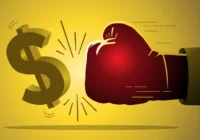Joe Biden promises to make America imperial again, as if that isn’t what every president is elected to. The Daily Devil’s Dictionary explains.
Former US Vice-President Joe Biden has finally entered the Democratic Party’s presidential primary race for 2020 and the media, citing the latest polling figures, have immediately declared him the frontrunner.
In his raggedly constructed speech to launch his campaign in Pittsburgh, Biden strove to consolidate his “folksy” image in the most literal way: using the word “folks” at least 30 times. To make sure people understand he’s one of them, he borrows a bit of political wisdom from known politicians who have had some success with crowds, including Bernie Sanders and Donald Trump.
From Sanders, he literally purloins a complete sentence: “Health care is a right, not a privilege.” He also follows Sanders on the question of education, which he wants to make “affordable,” avoiding the radicality of Sanders’ call for free education. Once those two issues established, his public will understand that’s no further reason to vote for Sanders.
But most of Biden’s borrowing, in ideological terms, is from President Trump. He spends the best part of his speech describing what middle-class life used to be like, but is no more, which implicitly translates as his solution to “making America great again.”
Shortly before his conclusion, Biden shows his cards, which reveal an ambition far greater than Trump’s “America First.” Starting from the obvious fact of the sheer size of the US military, Biden reveals his true credo, making it clear that the world itself and all it contains will soon be the intellectual property of the United States. “I know we are better positioned in a nation in the world to own the 21st century,” he said.
Here is today’s 3D definition:
Own:
To hold something as inalienable property, which when defined topographically or geographically is real estate. When defined topically, it can be any object. Applied temporally, ownership signifies unencumbered domination that at least appears to establish dictatorial powers.
Contextual note
Biden presents himself as the man who can stake a claim not just on the ownership of land, but also of a century that has only recently begun. What does Biden want to see happen in the 21st century that he claims America is destined to “own”? The politician makes the analyst’s job easier by citing his three favorite reasons for running for president: “The first is to restore the soul the nation and the second is to rebuild the backbone of this nation and third, is to unify this case, we already do better if we act as one America.”
The first reason announces the true scope of Biden’s ambition. He wants to be a spiritual leader, maybe like Elmer Gantry. Can Biden be the political messiah that Hillary Clinton had no hope of being? He knows the spiritual stakes: “[W]e’re reminded again, that that we are in a battle. We are in a battle for America’s soul.”
As a Roman Catholic, Biden should know that restoring one’s soul to enter into the Christian communion after sinning requires confession. But that doesn’t seem to be part of his agenda. He wants to confess Trump’s sins, not his own. And they are not lacking: for example, with regard to the Obama administration’s pandering to the military-industrial complex or Biden’s personal dismissal of Anita Hill, when she revealed that Supreme Court candidate Clarence Thomas was a sexual predator. In catechism, Biden should have learned that expressing regret does not equate with contrition. Trump’s worst sins — indiscriminately assaulting foreign populations, whether in Iran, Venezuela or Yemen — are no worse than Barack Obama’s and Joe Biden’s across the Middle East and North Africa during their eight years in office.
Biden’s second reason contains his attempt — in poker terms — to call Trump and raise him. But will people really believe he is “Middle-Class Joe, the union man? Trump’s working-class base doesn’t need to believe that the president is middle class… except in his shameless display of middling intelligence and classless rhetoric. Trump uses his celebrity status not to convince his voters he’s one of them, but that he’s a celebrity who doesn’t listen to traditional politicians (like Biden), which means he might just listen to them.
His third reason — unifying the nation — is laughable in an age of magnified polarization. But it is intended to frighten Democrats into accepting a nominee who stands for nothing and can, according to his logic, rally everyone.
Historical note
The notion of ownership sits at the core of US culture. Ownership is not only power, but the defining proof of identity. The idea of spending one’s whole life working for a living and not owning anything seems to Americans too close to Albert Camus’ idea of Sisyphus: futile endless repetition with no goal in sight. Working is ultimately about temporarily enduring obedience to others to end up “owning” one’s life. This is concretized by owning a home, a family and a dog. As Biden says, “It’s being able to send your kid to a park where you know they’re gonna come home safe, being able to own your own home, and not just have to rent it.”
Ownership is the unique goal and the ultimate unifying factor, even for those who reject “the system.” The hippies in the 1960s and their liberal sympathizers rallied round Woodie Guthrie’s song, “This land is your land, this land is my land,” in a vain attempt to convince their fellow Americans that “my” is a synonym for “our.” Guthrie even complained in the song that “there was a big, high wall there that tried to stop me” and then dismissed private property as an illusion. Since those days, property has never been more private.
The expression “to own something or someone” means to have absolute influence or control over them. Biden expresses the implicitly imperialistic aim most Americans subscribe to: using American values and institutions (more corporate than governmental) to control the resources — including people — of the entire world. Owning the 21st century means being in a position to dominate and dictate to a world of anonymous slaves.
In the end, ownership is not about land or objects, but about people. The US may be the world’s first constitutional democracy, but it is also the first and possibly last nation to include the ownership of people (slaves) as a fundamental component of its identity. And while slaves at home is a source of shame, owning the rest of the world sounds like just the sort of thing Americans aspire to.
*[In the age of Oscar Wilde and Mark Twain, another American wit, the journalist Ambrose Bierce, produced a series of satirical definitions of commonly used terms, throwing light on their hidden meanings in real discourse. Bierce eventually collected and published them as a book, The Devil’s Dictionary, in 1911. We have shamelessly appropriated his title in the interest of continuing his wholesome pedagogical effort to enlighten generations of readers of the news.]
The views expressed in this article are the author’s own and do not necessarily reflect Fair Observer’s editorial policy.
Support Fair Observer
We rely on your support for our independence, diversity and quality.
For more than 10 years, Fair Observer has been free, fair and independent. No billionaire owns us, no advertisers control us. We are a reader-supported nonprofit. Unlike many other publications, we keep our content free for readers regardless of where they live or whether they can afford to pay. We have no paywalls and no ads.
In the post-truth era of fake news, echo chambers and filter bubbles, we publish a plurality of perspectives from around the world. Anyone can publish with us, but everyone goes through a rigorous editorial process. So, you get fact-checked, well-reasoned content instead of noise.
We publish 3,000+ voices from 90+ countries. We also conduct education and training programs
on subjects ranging from digital media and journalism to writing and critical thinking. This
doesn’t come cheap. Servers, editors, trainers and web developers cost
money.
Please consider supporting us on a regular basis as a recurring donor or a
sustaining member.
Will you support FO’s journalism?
We rely on your support for our independence, diversity and quality.








Commenting Guidelines
Please read our commenting guidelines before commenting.
1. Be Respectful: Please be polite to the author. Avoid hostility. The whole point of Fair Observer is openness to different perspectives from perspectives from around the world.
2. Comment Thoughtfully: Please be relevant and constructive. We do not allow personal attacks, disinformation or trolling. We will remove hate speech or incitement.
3. Contribute Usefully: Add something of value — a point of view, an argument, a personal experience or a relevant link if you are citing statistics and key facts.
Please agree to the guidelines before proceeding.